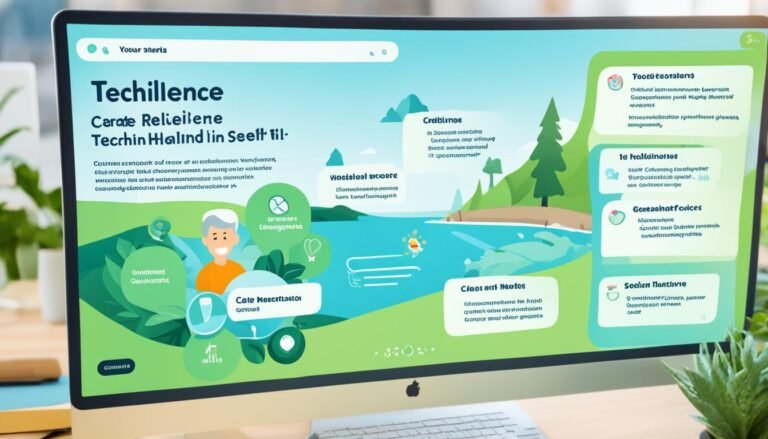Developing Digital Skills for Irish SMEs
Are Irish SMEs ready for a digital-first future, or are they falling behind in digital skills?
In today’s fast-changing business world, having the right digital skills is key to success. Irish SMEs need to adapt to digital tech to stay ahead and grow. But, many struggle with understanding digital skills, which holds back their online growth.
A €400,000 research project has been started to help bridge this digital skills gap. The Learnovate Centre in Trinity College Dublin, Cisco, and Skillnet Ireland are leading it. This platform is unique in Ireland, aiming to link people with the right skills for career growth. It tackles big industry challenges like learning, development, talent, and HR.
Government bodies like Skillnet Ireland and The Department of Further and Higher Education support this project. Workshops with Irish companies show the big need for basic digital and data skills. These skills are crucial for business growth and staying relevant in a digital economy.
Key Takeaways
- The critical role of digital literacy for businesses in adapting to a digital-first world.
- The €400,000 funded project aims to bridge the digital skills gap among Irish SMEs.
- Collaborations include Trinity College Dublin, Cisco, and Skillnet Ireland.
- Workshops have identified a significant shortage of core digital and data skills.
- Public and private partnerships are pivotal in driving digital upskilling forward.
- Aligns with EU objectives to enhance basic digital skills for 80% of the population by 2023.
- Governments support lifelong learning and upskilling initiatives through programs like ‘Skills to Advance’.
The Importance of Digital Transformation for SMEs
Irish SMEs face a fast-changing business world. They need to focus on digital transformation to stay ahead. This means building a strong digital base to boost profits and stay relevant in a digital world.
Enhancing Competitiveness
Companies that are more digital can adapt and bounce back faster during tough times. They can quickly change their business plans and try new things. Using digital tools helps them work better, cut costs, and make customers happier.
In Ireland, 40% of companies are still catching up on digital tech. But those that have gone digital are leading the pack in the market.
Driving Profitability and Growth
Putting money into digital growth can really help a company’s profits. A study by McKinsey found that digital tech could add €550 billion to Europe’s GDP by 2030. This shows the big financial benefits of going digital.
Ireland is home to 99.8% of all businesses, with 70% in non-digital sectors. By adding digital tools, these companies can find new ways to make money, work better, and grow over time. But, there’s still debate on how digital skills directly help with growth, so more research is needed.
Staying Relevant in a Digital-First World
The internet is growing fast, with a 60% jump in traffic from December 2019 to May 2020. SMEs must keep up with these changes. They need to use new tech like video calls, which became much more popular during the pandemic.
Industries like retail and healthcare are using more digital tools. This shows how important it is for Irish SMEs to use digital transformation to stay competitive. They need to use new tech to improve their market position and meet customer demands in a digital world.
Understanding the Digital Skills Gap in Irish SMEs
In recent years, a big digital skills gap has appeared in Irish SMEs. This gap is causing big problems and could affect their work a lot. It’s important to understand this gap to help SMEs in today’s digital world.
Current Statistics on Digital Skills
Reports show the tough situation Irish SMEs are in. For example, the MentorsWork report looked at 615 business owners and their digital skills. It found a big lack of IT graduates, which is holding back Ireland’s ICT sector.
Companies that improve their digital skills can offer more and compete better.
Challenges Faced by SMEs
One big issue is the lack of cybersecurity knowledge. Small businesses, especially those with fewer than nine employees, are more at risk of cyber attacks. This shows a big gap in being ready for the digital world.
Older businesses also struggle with using digital tools, making the digital divide worse.
Impact of the Digital Divide
The digital divide affects Irish SMEs in many ways. Companies without digital skills can’t keep up with new technology and what customers want. They also miss out on using digital tools for working together, which is key for doing well and growing.
Programs like MentorsWork, which provides direct advice and specific training, are crucial. They help bridge the digital skills gap and keep SMEs competitive in the changing digital world.
With focused training and support, Irish SMEs can overcome the digital skills gap. This will help them succeed in the digital age.
Benefits of Investing in Digital Skills Training
An effective digital skills investment boosts the performance and long-term success of small and medium-sized enterprises (SMEs). It makes them more efficient and profitable. Plus, it supports sustainable business practices.
Increased Turnover and Profitability
Investing in digital skills can lead to more money coming in and business profitability going up. Studies show that putting more money into digital skills could add €9.5 billion to Ireland’s GDP by 2025. This shows that focusing on digital skills can bring great financial gains.
But, there are hurdles. 41% of SMEs in Ireland don’t have someone in charge of digital skills. And only 26% think their staff have the basic digital skills needed. Yet, Dublin firms are keen on upskilling, with almost 70% planning to take a course in the next year. This shows that investing in digital skills is key to staying ahead.
Environmental Sustainability
Digital skills training also helps with sustainable business practices. SMEs that invest in these skills can use digital tools to cut waste and support eco-friendly ways of working. For example, skills in data analytics can help track and reduce carbon emissions.
Ireland is committed to digital growth, with programs like the National Grand Challenges Programme Fund. This fund gives €65 million to research solutions in areas like the Green Transition and Digital Transformation. This shows how digital skills and sustainability go hand in hand.
| Metric | Percentage |
|---|---|
| Digital Journey Completion (Irish SMEs) | 62% |
| Businesses with Designated Digital Skills Developer | 41% |
| Employees with Necessary Digital Skills | 26% |
| Dublin Firms Ready for Digital Upskilling | 70% |
By understanding the link between digital skills, business success, and sustainable business practices, Irish SMEs can gain a competitive edge. This helps them work towards a greener and more efficient future.
Online Business Strategies for Irish SMEs
Irish SMEs make up 99% of all active businesses and employ 70% of the workforce. It’s vital for them to use effective online strategies. The move to a digital-first world has sped up, with 80% of European small businesses using more digital tools during the pandemic. We’ll look at key strategies for an online presence, using e-commerce, and digital marketing.
Building an Effective Online Presence
Having a strong online presence is key for Irish SMEs. Shockingly, 45% of SMEs in Ireland lack their own website, compared to the EU’s 23%. A website is like a digital shop, giving customers info and ways to connect with your business. Keeping it updated, using customer feedback, and SEO can make you more visible and trusted.
Utilizing E-Commerce Platforms
Learning about e-commerce can help SMEs earn more. They should look at Shopify, WooCommerce, or Magento to reach more people. E-commerce lets businesses sell beyond their area, bringing Irish products worldwide. Research shows 30% of exporters could sell more with better digital skills, showing e-commerce’s role in growth.
Implementing Digital Marketing for SMEs
Good digital marketing for SMEs includes social media, email, search engine, and content marketing. Sadly, 47% of Irish SMEs skip social media and video, missing out on engagement. Targeted campaigns can help reach certain groups and increase site visits. Surveys reveal nearly 40% of SMEs could double their sales with more digital skills, showing the value of these marketing efforts.
Investing in these strategies can lead to big growth and stability. With the right digital tools and training, Irish SMEs can stay competitive in a fast-changing digital world.
Programs and Initiatives Supporting Digital Upskilling
In Ireland, the business world is always changing. SMEs need to keep up by learning new digital skills. Many programs have started to help bridge the gap in digital skills. This ensures businesses can do well in a world that’s more digital every day.
The ‘You’re the Business’ Program
The ‘You’re the Business’ program helps Irish SMEs get better at using digital tools. It gives them the skills they need to compete globally. The program covers topics like digital marketing, selling online, and understanding data.
It’s important because almost half of Irish SMEs haven’t learned any new digital skills. This shows how much they need this kind of training.
This program also helps non-IT workers learn digital skills. This way, every employee can help the business grow digitally. By joining the ‘You’re the Business’ program, SMEs can make more money and stay competitive.
Skills to Advance Initiative
The Skills to Advance program helps Irish businesses by teaching their workers new skills. This is key because 46% of SMEs think their staff lack the skills for new tech. The program offers courses like a Master’s in Artificial Intelligence and a Master’s in Leadership, Innovation & Technology.
These courses are setting new standards for digital learning in Ireland. The program also works with Technological University Dublin to offer courses like the Postgraduate Diploma in Sports Analytics, Technology and Innovation. These courses improve workers’ skills and help SMEs grow and get ready for the digital future.
Programs like ‘You’re the Business’ initiative and Skills to Advance are crucial for Irish SMEs. They help businesses stay competitive, increase profits, and keep up with the digital world.
Developing Digital Skills for Irish SMEs
Small and medium-sized enterprises (SMEs) in Ireland need to boost their digital skills. Technology is changing fast, making it crucial for SMEs to keep up.
Recent data shows that over 60% of Irish businesses think their workers need more training in digital skills and sustainability. This shows how important it is for SMEs to learn more about digital skills. Also, 65% of businesses believe their staff need training for the digital shift. This shows a big need for learning new tech skills.
| Upskilling Needs | Percentage |
|---|---|
| Digitalization and Sustainability | 60% |
| Training for Digital Transition | 65% |
| Climate Action and Sustainability Skills | 35% |
| Energy Efficiency Importance | 64% |
| Recruitment Difficulties | 51% |
Despite the challenges, Irish businesses are hopeful for the future. 49% of SMEs feel confident, and 94% of big companies do too. This hope comes from groups like Skillnet Ireland. They work with almost 25,000 businesses through 70 Business Networks to help with talent development and upskilling.
Skillnet Ireland is really focused on helping SMEs learn more about digital skills. They have many national initiatives and networks. They’re pushing for more tech skills and sustainability in businesses. This is key for businesses to stay competitive and follow global trends.
One-third of Irish SMEs lack basic digital skills, showing the need for more learning. But, Ireland is doing well in this area. It’s second in the EU for ICT graduates and third for digital skills.
In conclusion, teaching digital skills to Irish SMEs is vital. It’s not just about keeping up with technology. It’s also about growing, being more energy efficient, and being sustainable.
Case Studies of Successful Digital Transformation in SMEs
This section shares digital transformation case studies of Irish SMEs. It highlights their success and breakthroughs. We look at the strategies and innovations these companies used. Learn from digital pioneers and see how they grew digitally.
Local Success Stories
Irish SMEs have many success stories. They show how they’ve adapted and thrived in the digital world.
- SuperValu: This grocery chain used e-commerce to reach more online shoppers. This helped them increase sales. They’re now a model for other SMEs in retail.
- Glanbia: A global nutrition group, Glanbia, used digital tech like chatbots and big data. This helped them stay ahead and improve their operations.
- Keelings: An Irish company, Keelings, grew their online presence with apps and marketing. This boosted their sales and distribution channels.
- CRH plc: This leading group in building materials used digital tools to improve their supply chain. This made them more efficient and successful in a digital market.
Lessons Learned from Digital Pioneers
Learning from digital pioneers is key for SMEs starting or improving their digital transformation.
- Adapt to E-Commerce: About 30% of sales in Ireland come from online shopping. SMEs need strong online strategies to compete. Those that went online during the pandemic saw a 60% revenue boost.
- Invest in Advanced Technologies: Irish firms using chatbots, big data, and machine learning are more profitable. For example, manufacturing firms using these techs did better than construction ones.
- Develop Digital Skills: Investing in digital skills helps SMEs grow. Those that focused on digital hiring more staff and saw big revenue increases.
- Consumer Expectations: Over 70% of young consumers want digital payment options. SMEs must offer these to improve their service and growth.
These success stories and lessons from digital pioneers show how digital tools can help SMEs grow and succeed.
Conclusion
The journey of digital transformation for Irish SMEs is full of both challenges and big opportunities. With 42 percent of Irish people saying they’re ‘below average’ in digital skills, we see a big need for action. Our article highlights how mastering digital skills is key for SMEs to stay ahead and innovate in a digital-first world.
Programs like Project EAGLE show how working together can help fill digital skills gaps. With support from Skillnet Ireland and the European Commission, these efforts aim to boost advanced digital skills. Initiatives like ‘You’re the Business’ and Skills to Advance also help. They make sure SMEs from all over and different backgrounds can join in.
To move forward, Irish SMEs must really focus on getting better at digital skills and keeping up with new ones. This way, they can play a big part in the economy, drive innovation, and be strong in the tech market. It’s crucial for SMEs to use the training and resources out there to succeed in this digital age. This will help them stay ready and strong for the future.
Source Links
- Unique national skills platform will help close Ireland’s digital skills gap
- Skills to Advance – Ireland
- TechLEARN For SMEs
- the case of Western Balkans
- The digitalisation of small and medium enterprises in Ireland – Models for financing digital projects – Executive Summary
- Understanding the Digital Skills Gap and the Opportunities It Presents
- MentorsWork report shows SMEs can benefit from the digital skills gap – Business & Finance
- Investment in digital skills could contribute €9.5bn to Ireland’s GDP over the next three years – TechCentral.ie
- Home
- Ireland: a snapshot of digital skills
- ‘You’re the Business’ – a new digital training scheme for Irish SMEs – Local Enterprise Office
- Over 13,000 People Undertake Digital Skills Upskilling with Skillnet Ireland
- ‘You’re the Business’ – a new digital training scheme for Irish SMEs – Local Enterprise Office
- New Research from Skillnet Ireland Highlights Importance of Digital and Sustainability Upskilling for Irish Businesses
- Irish enterprise digitalisation: A cross-country exploration
- The digitalisation of small and medium enterprises in Ireland – Models for financing digital projects – Summary Report
- Ireland’s Digital Divide | Bridging the Gap | Accenture
- Project EAGLE – tackling digital skills gaps throughout European SMEs








